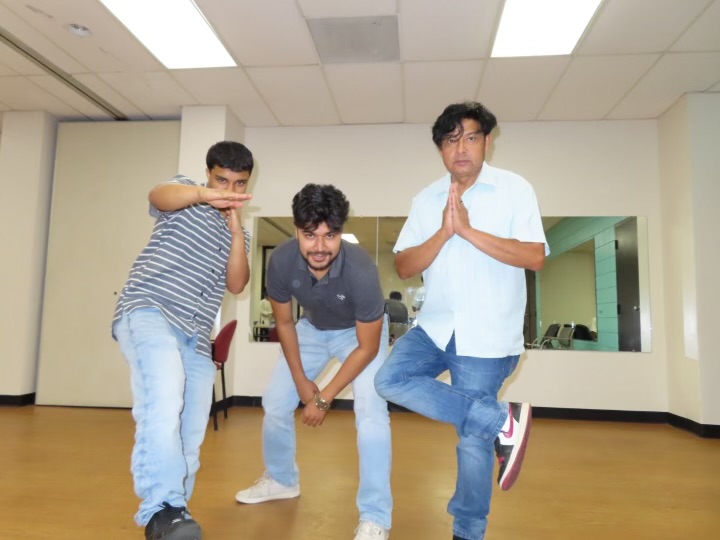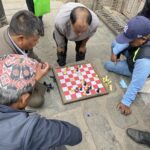
Understanding Mental Health One Hand at a Time
When I started working for the BRIDGE (Building Resilience, Inspiring Dreams, and Guiding Education) program, I quickly realized that my understanding of mental health was limited. Even though I had a background in neuroscience, my understanding of mental health complications was limited to what I had read in books. I was ignorant of socio-economic factors affecting the South Asian immigrant population and the effect it had on our mental health. My work has profoundly reshaped my perspective on mental health, especially within South Asian immigrant communities.
The BRIDGE Program was made to address the gap between the education system and the needs of South Asian immigrant student and families. Our goal was to find resources and assist the struggling students. This initiative has opened my eyes to how mental health issues manifest in immigrant communities and how they can be passed down through generations. Both positive and negative mental health habits develop over time, impacting the emotional well-being of families. We connected with over 100 students aged 10 to 21 and their families, closely monitoring those who required help and support. Some students didn’t require any help, while some needed both short-term and long-term support, either in education or family affairs and legal matters. The majority of our clients were Bhutanese Nepali students, providing us with valuable insights into the mental health landscape of our community.
To measure mental health, we utilized two assessment tools: Youth Mental Health Screening and the Hopkins Test.Higher score meant more mental stress on these tests. We analyzed and observed these scores against various factors, including age, gender, frequency of service provided, and other socioeconomic challenges. This revealed many aspects of our community that I had previously overlooked. During the early phase, regular exposure to the emotional struggles took a toll on my mental health. I was anxious to approach clients or engage them in meaningful conversation. I found myself distracted or speechless, often fidgety and reaching for water when clients were sharing their emotions. As I acclimated to my role over time, I developed a deeper empathy for their situations. Some of the factors of mental health were beyond our control. I gained a deeper and broader understanding of the behavioral, social, and existential traits causing mental stress. Immigrants often face heightened mental health challenges due to the stress of adjusting to a new culture and system. This anxiety is compounded by the pressure to support struggling family members. Economic hurdles and poverty, commonly seen as a reason for deteriorating mental health, are not due to a lack of ability but because of social constraints and familial expectations in immigrants. Under constant exposure, these stressors lead to forgetfulness, an inability to learn new information, aggression, declining physical activities, eating disorders, etc. Constantly missing school and poor academic performance are leading indicators of mental health decline, as school requires consistent focus and attention to detail.
This cycle of stress can perpetuate mental health issues across generations. For Bhutanese refugees, their lived experiences are a significant contributor to mental health struggles. Yet, breaking this cycle remains a challenge. Language barriers further complicate access to healthcare and educational support. In low-income and under-educated households, children often assume adult roles early, helping their parents navigate daily tasks, appointments, and visits, while managing school. Mental health scores of students in such households were higher in comparison to students in households where they had minimal responsibilities.
I also worked with students abusing illicit substances as a coping mechanism. In our community, there is a common perception that young people who use drugs are simply “spoiled” and engage in drug use for fun or entertainment, disregarding their responsibilities. It’s crucial that we approach this issue through a more empathetic lens, one that allows us to understand the deeper challenges these individuals face rather than merely judging their actions.
I am seeking a transformative approach to mental health. Instead of asking, “Why is this person using drugs?” I ask, “What is causing this person to self-medicate through drugs?” Often, there is an underlying reason for such behavior, which goes far beyond the idea of irresponsible indulgence. I am not disregarding the cases of drug dependency due to boredom and curiosity. However, many who use substances do so as a way to cope with difficulties such as loneliness, anxiety, depression, ADHD, or PTSD. It’s important to recognize that drug use is not always the sole coping mechanism. They may also be battling other forms of escapism, such as inactivity or internet addiction. This serves as a diversion from the harsh realities we face. Both substance use and internet addiction are ways of numbing the pain and avoiding the challenges that come with their circumstances. This perspective shifts the focus from labeling and judging to understanding and offering support.
Rather than condemning them for their actions, we should seek to understand the root causes of their behavior and offer help to address these underlying issues. When we exert empathy and compassion, we can provide the support necessary for teens to heal and have a positive outlook on life. Being part of BRIDGE, witnessing and providing resources to individuals navigating their needs and emotions, has significantly shaped my mental growth. However, I sometimes find myself carrying the weight of these stories, especially as the program grows and we encounter cases that seem like outliers, but they are not outliers. They are representative of systemic issues we face as immigrants.
Balancing work and personal life can be challenging, but I’ve found that maintaining a routine helps me manage my mental well-being. Playing sports, reading, and embracing a mindset of continuous learning are all crucial parts of my self-care. Reading just 10 pages a day has become a small but powerful habit, reminding me that even the biggest tasks are achievable when broken down into manageable steps. This approach not only helps me stay grounded during hectic times, but it also reinforces the importance of consistency and progress, no matter how small the effort.
I play sports, read, and constantly seek to learn new things. Writing serves as a therapeutic outlet for me, allowing me to take inspiration from my own experiences and express my feelings. Going for walks is another essential practice. As philosopher Friedrich Nietzsche once said, “All truly great thoughts are conceived by walking.” Walking helps me manage mental stress by giving me the space to slow down and reflect. As I walk, the rhythmic movement allows my mind to process thoughts without the pressure of distractions. It helps me gain a clearer perspective on the issues at hand and make better decisions. Additionally, I prioritize hydration, as staying well-hydrated combats sluggishness and keeps me energized throughout the day. I drink a gallon of water every day. I share thoughts and openly communicate with like-minded individuals; it not only helps me deal with my own situations but also alerts me when I may not be doing well. Despite my efforts, I come across times when my emotions take over me, and I get a dull headache and my eyes grow heavy. During those times, I take a nap. Napping plays a crucial role in maintaining mental health by providing the brain with much-needed rest and restoration. Naps can help reduce stress and anxiety, as they promote relaxation and allow the brain to process emotional experiences. With the right breathing and concentration, a nap is an effective means of moderating stress.
Understanding these healthy coping mechanism practices is something we have also been incorporating into our Mental Health Conference. NAYMH (New American Youth Mental Health) volunteers play a pivotal role in this effort, contributing significantly to the community’s collective mental health well-being.
Here is my view on mental health: Mental well-being is a circle, it goes from good times to bad times, to good times, to bad times over and over again. Sometimes life gets us to the best moments and other times it throws us into the darkness. As long as I am learning from it and moving forward, I am doing fabulously. Sometimes I can’t walk out of my struggles on my own. My mood becomes stagnant and I need a helping hand. Helping hands are often found in the form of a family member, friend, relative, or simply a well-wisher who helps me clear my thoughts and navigate through my situations through positive conversation and acceptance.
The need for compassionate support within our community has never been more urgent. The absence of reliable guidance is taking a toll on immigrant students, leading to poor academic performance and unhealthy coping mechanisms. One of the many resources provided—BRIDGE Builders mentorship program, offered by BCCO with the help of NAYMH volunteers and our dedicated community members, we are working to address these challenges and provide the support these students so desperately need. In recent years, the mental health of immigrant communities has been increasingly at risk, further exacerbated by the lasting impacts of the COVID-19 pandemic, economic instability, and shifting government policies. Many individuals are still struggling to regain their footing, and what they need most is a compassionate and empathetic approach to help them navigate these hardships.
New American Youth Mental Health (NAYMH) stands committed to fostering open discussions about mental health, aiming to break the stigma that often surrounds it. We aspire to create a community that not only acknowledges and respects mental health struggles but also uplifts and celebrates the resilience within our stories. Together, we can build a future where understanding, compassion, and support lead the way toward healing and growth.
– Adarsh Sharma



